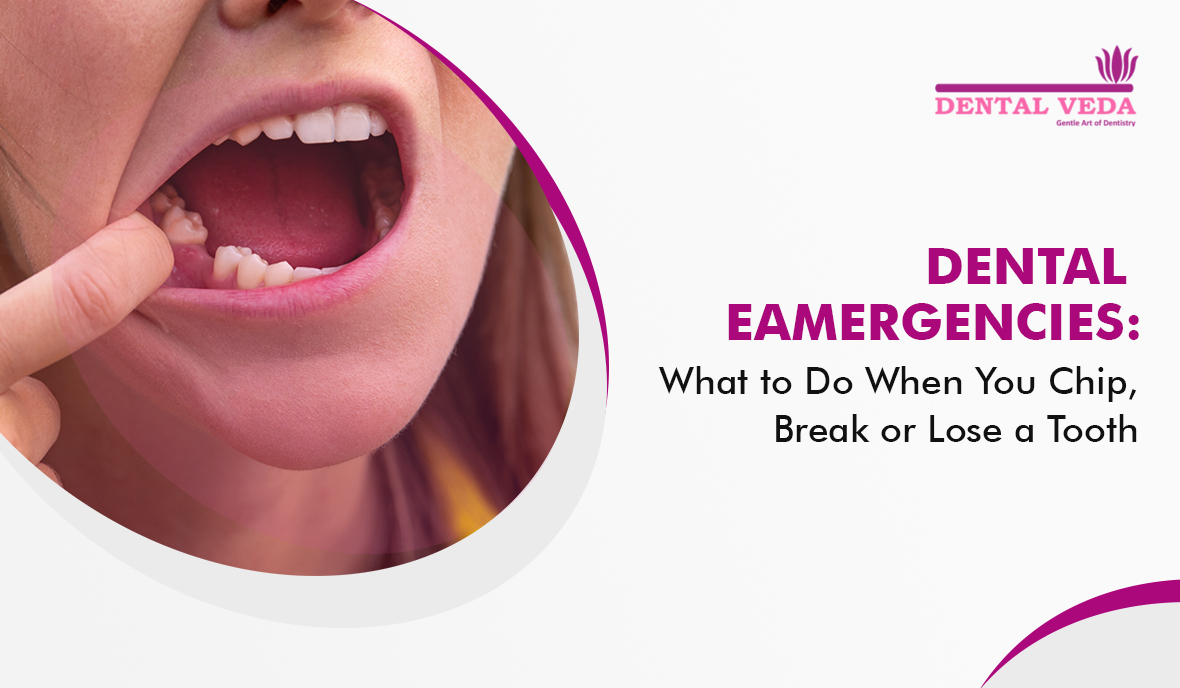Imagine you are savoring your favorite snack or candy, lost in the moment when you suddenly hear a crunch followed by a sharp pain in your mouth.
Your heart sinks as you realize you’ve chipped a tooth. Or perhaps you are playing football with your friends when an elbow to your face chips or breaks one of your front teeth.
A dental emergency is a scary and painful experience that can strike when you least expect them!
But fear not!!
The dentist can fix it in several ways.
Get your tooth fixed as soon as possible if it has been fractured, chipped, or broken. Alternatively, your tooth can get further damaged or infected, possibly leading to loss.
Now, let’s take a closer look at the most common dental emergencies and how to deal with them. So, if you’re worried about what to do in a dental emergency, keep reading and learn how to protect your teeth and gums in any situation.
What do you understand by dental emergencies?
Dental emergencies refer to unexpected dental issues that require immediate attention due to their severity and urgency. In such situations, prompt dental care is required to prevent further damage or to alleviate discomfort and pain.
Dental emergencies can be painful and cause sensitivity to hot and cold temperatures and, at times, make it difficult to eat and talk properly. In any case, taking action as soon as possible is important to minimize the damage and prevent further problems.
Common causes of dental emergencies
A variety of factors can cause dental emergencies. Some of the most common causes include:
- Trauma to the mouth or face
- Biting down on something hard
- Decay or cavities
- Gum disease
- Sports injuries
- Accidents or falls
- Dental fillings that have worn down
Different types of Dental Emergencies: What to do?
Chipped or Broken Tooth
A chipped tooth is a dental emergency that occurs when a portion of a tooth’s enamel is damaged while the tooth remains in place. A chipped tooth is mostly a cosmetic problem, but it can make the tooth vulnerable to fracture.
A broken or cracked tooth occurs when a tooth is fractured or cracked, resulting in partial or complete separation of the tooth structure. If the tooth is cracked or broken, the damage extends past the enamel, exposing the sensitive root or interior of the tooth, called the pulp.
How to handle a chipped or broken tooth
Here are a few things you can do if you have a chipped or broken tooth:
- Rinse your mouth:
- Apply cold compressor:
- Save broken pieces of tooth:
- Visit your dentist:
Start by rinsing your mouth with warm water to clean the area around the cracked or chipped tooth. This can help remove any debris left in the mouth.
To ease pain and discomfort and reduce swelling, place a cold compress on the outside of your cheek or near the chipped tooth. This can help minimize swelling and provide relief.
If you can find the broken pieces of your broken tooth, rinse them with water and wrap them in wet gauze. Your dentist may be able to use these pieces for restoration.
It is important to contact your dentist as soon as possible and schedule an emergency appointment to start the restoration process.
When you see a dentist, they may recommend a filling or crown to repair the tooth. They may need to perform a root canal or extraction in severe cases.
Treatment Procedures for a Chipped Tooth
If you have a chipped tooth, seeking prompt dental care is important for proper diagnosis and treatment. The specific treatment procedures may vary depending on the chip’s size, location, and severity, as well as the patient’s overall oral health. However, here are some common treatment options for a chipped tooth:
- Smoothing Rough Edges:
- Dental Bonding or Veneers:
- Dental Crown or Onlay:
- Root Canal Treatment:
If the chip is minor and there is no pain or sensitivity, the dentist may simply smooth the rough edges of the tooth to prevent further damage or irritation.
For small to moderate damage to the teeth, dental bonding or veneers may be used to restore the shape and appearance of the tooth. Dental bonding involves applying tooth-colored resin to the chipped area and shaping it to match the natural tooth, while veneers are thin porcelain shells custom-made to cover the tooth’s front surface.
If the chip is extensive and has caused significant structural damage, a dental crown or onlay may be recommended. A dental crown is a cap that covers the entire tooth, while an onlay is a partial crown that covers only the damaged portion of the tooth. Crowns or onlays are typically used for larger chips or when the tooth has undergone root canal treatment.
If the tooth’s inner pulp is exposed, a root canal treatment may be necessary to remove the damaged pulp and prevent infection. After root canal treatment, a dental crown is often placed to protect and restore the tooth.
Lost tooth
Losing a tooth can be a distressing experience and is considered a dental emergency. A lost tooth refers to a tooth that has been completely knocked out or pulled away from its socket due to trauma or injury to the mouth or face. It can occur due to accidents, sports injuries, falls, or other traumatic events.
What to do if you lose a tooth?
If you have a tooth knocked out, it’s important to act fast. First, you should find the tooth and rinse it with water. Be careful not to touch the root of the toot or clean it with any other solution, as this can damage it.
You can place it in a container of milk or saliva until you can see a dentist. It’s important to see a dentist as soon as possible, as they may be able to save the tooth if it is re-implanted within 30 minutes to an hour.
Treatment Procedures for a Lost Tooth
If a tooth has been completely knocked out, seeking immediate dental care is crucial to increase the chances of saving the tooth. Here are the treatment procedures your dentist may recommend for a lost tooth:
- Dental Re-implantation:
- Dental Restoration:
- Replacement Options:
If the tooth is viable for re-implantation, the dentist will carefully reposition the tooth back into its socket and stabilize it with a splint or wire for a period of time to allow for healing.
Once the tooth is stabilized, the dentist may need to perform additional treatments, such as root canal treatment or dental crown placement, to ensure the long-term health and stability of the tooth.
If the lost tooth cannot be re-implanted or saved, the dentist will discuss replacement options with the patient, such as dental implants, bridges, or dentures, to restore the function and appearance of the missing tooth.
Preventive measures to avoid dental emergencies
There are several things you can do to prevent dental emergencies. These include:
- Wearing a mouthguard when playing sports
- Avoiding hard or sticky foods
- Brushing and flossing regularly
- Seeing a dentist for regular checkups and cleanings
- Treating cavities and gum disease promptly
By following these steps, you can help protect your teeth and gums and reduce your risk of a dental emergency.
When to seek emergency dental care
In some cases, dental emergencies require immediate attention. If you have severe pain, bleeding, swelling, a broken jaw, or a tooth knocked out, you should immediately seek emergency dental care.
If you’re unsure whether your situation requires emergency care, you can call a dentist or dental clinic for advice. They can help you determine whether you need to be seen right away or if you can wait for an appointment.
Conclusion
Dental emergencies, like chipped, broken, or lost teeth, can happen unexpectedly and require immediate attention. You can handle them like a pro with the right knowledge and preparation.
So if you’re worried about what to do in a dental emergency, remember these tips and stay calm. With the right care and attention, you can get through any dental emergency and come out smiling on the other side.
Looking for the best dentist in Gurgaon? Look no further than Dental Veda, a well-facilitated dental facility in Gurgaon. Book an appointment today and experience top-quality dental care from experienced dental care professionals.
Frequently Asked Questions
How can I reduce the pain while waiting for treatment?
If you are experiencing pain while waiting for the treatment, here are a few things you can do to reduce the discomfort:
- Use over-the-counter medications to alleviate dental pain temporarily
- Rinse your mouth gently with warm salt water
- Avoid chewing food on the affected side until you receive dental care
- Apply a cold compress or ice pack on the outside of your cheek or jaw near the painful area
- Practice good oral hygiene to keep the affected area clean and prevent further irritation
Can I use a temporary dental filling to repair a chipped tooth?
Using a temporary dental filling DIY repairs at home is not recommended as it is not an effective and long-lasting solution. Moreover, DIY repairs can also cause further damage to the gum and tooth. It is best to consult your dentist for professional evaluation and seek immediate treatment.
What to do if you have a broken jaw or severe facial injuries?
If you have a broken jaw or severe facial injuries, it is important to seek emergency medical care immediately. Avoid moving your jaw or applying pressure to the affected area, and go to the nearest hospital or call emergency services for immediate medical attention.


